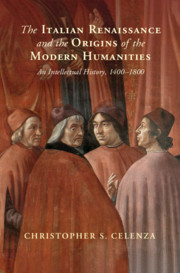Book contents
- The Italian Renaissance and the Origins of the Modern Humanities
- The Italian Renaissance and the Origins of the Modern Humanities
- Copyright page
- Dedication
- Contents
- Figures
- Preface and Acknowledgments
- 1 Philology, the Italian Renaissance, and Authorship
- 2 Lorenzo Valla, Philology, Emotion
- 3 Losing Your Identity: Angelo Decembrio
- 4 Trust and Authenticity
- 5 Pursuing a Love of Knowledge
- 6 Shaping Knowledge
- 7 Forgetting Philology: René Descartes
- 8 Certainty. Skepticism
- 9 Echoes
- Bibliography
- Index
2 - Lorenzo Valla, Philology, Emotion
Published online by Cambridge University Press: 09 November 2021
- The Italian Renaissance and the Origins of the Modern Humanities
- The Italian Renaissance and the Origins of the Modern Humanities
- Copyright page
- Dedication
- Contents
- Figures
- Preface and Acknowledgments
- 1 Philology, the Italian Renaissance, and Authorship
- 2 Lorenzo Valla, Philology, Emotion
- 3 Losing Your Identity: Angelo Decembrio
- 4 Trust and Authenticity
- 5 Pursuing a Love of Knowledge
- 6 Shaping Knowledge
- 7 Forgetting Philology: René Descartes
- 8 Certainty. Skepticism
- 9 Echoes
- Bibliography
- Index
Summary
This chapter examines the fifteenth-century thinker Lorenzo Valla (1406–57), whose work serves both as an emblem of a certain style of reading in the fifteenth century and as a connector to today’s debates on the humanities. Through his meticulous reading and scholarship, Valla accomplished a number of things. He uncovered a historic forgery claiming that the Church was owed substantial property by secular rulers, doing so with both emotional appeals to common sense and technical criticism of the language of the forgery. He wrote the most successful presentation of the Latin language’s grammar and syntax in the Renaissance – an exceedingly important accomplishment, since Latin was the language of international scholarship. He opened the floodgates to the later, 16th-century Reformation by suggesting that the Latin Vulgate Bible’s language could be changed to reflect the meaning of the original Greek in which the New Testament was written. This move was momentous, since by Valla’s day 1,000 years of Christian theology had been practiced with the Latin Vulgate as its basis. The chapter also argues that to understand him – and by extension the humanities at large – emotions need to be brought into the picture.
Keywords
- Type
- Chapter
- Information
- The Italian Renaissance and the Origins of the Modern HumanitiesAn Intellectual History, 1400–1800, pp. 20 - 64Publisher: Cambridge University PressPrint publication year: 2021



